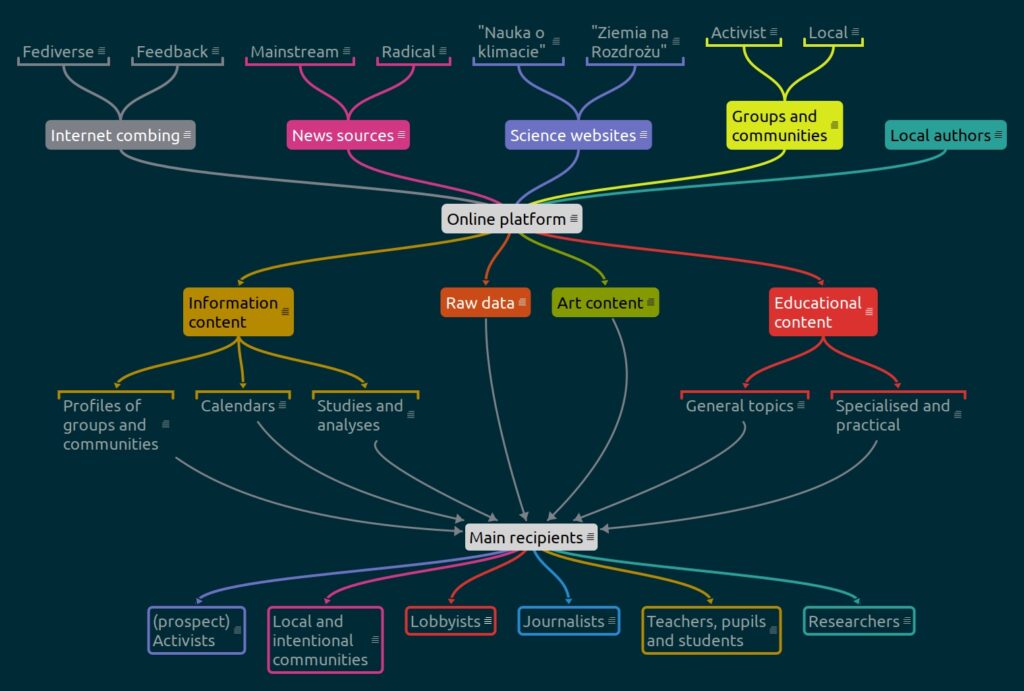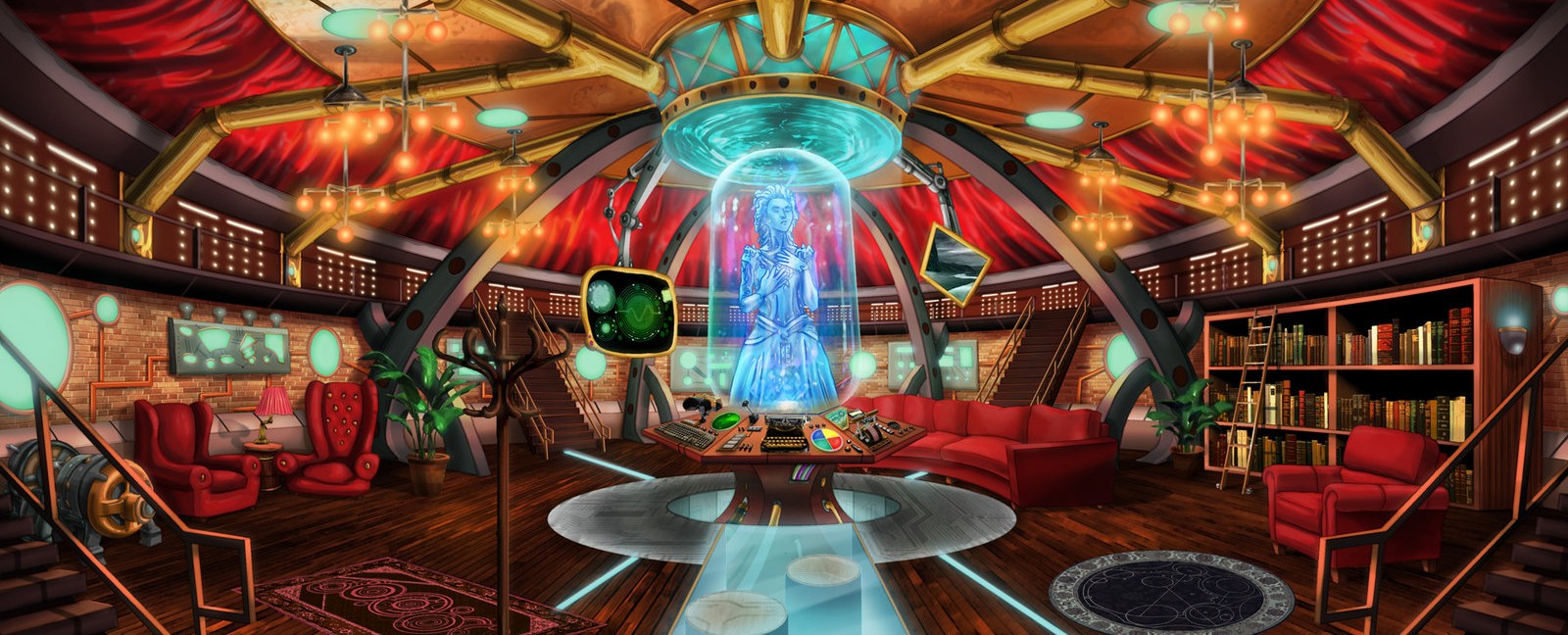The primary task of the programme is to educate, inform and inspire individuals (and communities, collectives or institutions) dealing theoretically or practically with the subject of the unfolding collapse of industrial civilisation, and with grassroots, community-based forms of confronting it.
Our area of operation is Poland, but everything we do can be easily cloned in any location.
The tool for this is an online platform that allows us to collect, store and share information in various formats.
Within our declared boundaries, we strive to remain impartial, above all avoiding infights and proselytising. We face challenges that cannot be accurately predicted, so every rationally justified approach (and some irrational ones), carries the potential for success.
Our long-term goal is to make a contribution to preparing the next generation for the world we are leaving them to live in.

Online platform
A stack of software, running on an internet server, helping us perform our tasks. More information here.
Sources of information
Searching the web
We treat the internet as an open information channel from which we will retrieve, filter and moderate content that is not otherwise readily available.
- Fediversum.
Decentralised social networks provide mechanisms for searching and providing information on selected topics.
They are free from censorship and algorithms that limit coverage.
This allows the ‘long tail’ to be managed: information that is miej popular, with local or niche reach. - Feedback comments.
Feedback from platform users is an important channel. We place a strong emphasis on community moderation and collaboration with users.
Information services
We are compiling a list of trusted (to varying degrees) news sites providing news on topics of interest.
- Mainstream sites.
Mainstream sites such as PAP, Reuters and other media outlets are a good source of official news, positions and opinions.
- Radical websites.
By radical news services we mean sources of news, positions and opinions, contesting, criticising and supplementing mainstream information.
Examples of such services would be https://crimethinc.com/, https://itsgoingdown.org/, https://exignorant.wordpress.com, or https://a22network.org/.
Science websites
The basis for education, information and inspiration must be scientific knowledge. Further valuable sources of openly licensed scientific information are emerging, in addition to the leading https://naukaoklimacie.pl and https://ziemianarozdrozu.pl.
- Nauka o klimacie (Science on climate).
“The mission of our portal is to provide you with reliable, well-documented knowledge about our planet’s climate system in an accessible and transparent way. “ - Ziemia na rozdrożu (Earth at the Crossroads).
A science and journalism website about the energy transition.
Groups and communities
An important part of inspiration is the dissemination of good practices and reports from local and intentional communities and activist groups.
Our emphasis is on working with lesser-known groups with little representation in the information circuit.
- Activist.
Activist movements and groups of various kinds whose theory and practice stay within our declared hard boundaries. - Local.
Local communities are mostly cut off from unempowered and under-informed. We seek contact with those who are taking action and can share information about both the successes and the problems they face.
Local authors
As we expand the team, we will also create our own content: artistic, journalistic and scientific. Other sources will be competitions, educatons and other animation and integration events.
Forms of publication
Information content
We will publish facts, analysis and commentary as a constant stream of information, for anyone wishing to be “in the loop”. This is also where we will report on publications coming into circulation.
- Profiles of groups and communities.
In addition to current information, we will publish characteristics and information about groups and communities we know.
In the first instance, we will offer them to manage this information themselves. In any case, we will clearly separate comments from factual information. - Calendaries.
The chronological arrangement of the information will allow both to maintain historical context and to learn about upcoming events. - Reviews and analyses.
Studies, commentaries and analyses, especially those based on data from our repository, will give the audience a cross-sectional perspective on selected topics. Animations and infographics will be an important form here.
Raw data
Our platform stores data in a wiki-type structure, together with metadata classifying it according to a number of criteria. This allows for quick and precise searches, or free wandering through the structure of associations.
In the next stages of development, we will be developing search support via an “artificial intelligence” – LLM model (large language model).
Artistic content
Art is an important means of expression. From the beginning, we are creating a repository of artworks in various forms, together with their documentation and information about their author(s) – especially Polish ones.
We will not only promote works of art, but also support Polish authors by helping them to sell their works.
Educational content
Education is our most important task in the long run. That is why we place special emphasis on the search for – and, in the perspective, the production of – high-quality educational materials (especially e-learning).
- General.
General education encompasses both topics from different disciplines, natural sciences, sciences, but also psycho-social and economic, as well as building competence for critical analysis and multidisciplinary synthesis (systems approach).
Knowledge and skills marginalised or displaced from public education are often essential for the recovery of individual and collective agency. - Specialised and practical.
Tutorials, tutorials, simulations and practical workshops enable those who participate to become competent in solving technical problems and in heuristically creating new solutions.
Main intended recipients
All creations (content and tools) of the “Looking Up” programme are by default published under an open CC-BY-SA licence and publicly available to anyone. However, in the process of creating them, we primarily have specific groups of people in mind.
- Persons who are (potentially) activists.
People who want to start (or deepen) their involvement in activism will be looking not only for information about who, what and where they are doing, but also for tools for action – and self-care in the emotional, intellectual and physical spheres.
They will need both educational, artistic and informational content. - Local or Intentional Communities.
Communities will primarily be looking for information of direct relevance to them, including descriptions of possible actions, good practices and solutions to various problems they face. - Lobbyists.
Lobbying activities primarily require access to data, but also an evocative presentation of this data in the form of reports, presentations and infographics. - Journalists.
Media employees will need leads of interesting topics, cross-checking of news, and studies to refer to. - Teachers, pupils and students.
Learners or students will need good quality studies and analysis, as well as educational materials tailored to their school level.
Teachers will be looking for teaching materials that are useful for lesson preparation on their chosen topic. - Researchers.
All individuals, regardless of official status, conducting desk research. They will want direct access to the raw data including metadata, and multi-criteria searching.
More information you will find in our Frequently Asked Questions.
